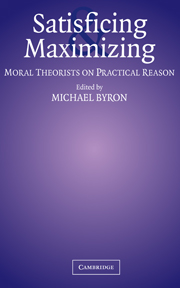Book contents
- Frontmatter
- Contents
- Contributors
- Introduction
- 1 Two Views of Satisficing
- 2 Satisficing as a Humanly Rational Strategy
- 3 Maxificing: Life on a Budget; or, If You Would Maximize, Then Satisfice!
- 4 Satisficing and Substantive Values
- 5 A New Defense of Satisficing
- 6 Satisficing: Not Good Enough
- 7 Why Ethical Satisficing Makes Sense and Rational Satisficing Doesn't
- 8 The Plausibility of Satisficing and the Role of Good in Ordinary Thought
- 9 Satisficing and Perfectionism in Virtue Ethics
- 10 Could Aristotle Satisfice?
- 11 How Do Economists Think About Rationality?
- Bibliography
- Index
11 - How Do Economists Think About Rationality?
Published online by Cambridge University Press: 04 December 2009
- Frontmatter
- Contents
- Contributors
- Introduction
- 1 Two Views of Satisficing
- 2 Satisficing as a Humanly Rational Strategy
- 3 Maxificing: Life on a Budget; or, If You Would Maximize, Then Satisfice!
- 4 Satisficing and Substantive Values
- 5 A New Defense of Satisficing
- 6 Satisficing: Not Good Enough
- 7 Why Ethical Satisficing Makes Sense and Rational Satisficing Doesn't
- 8 The Plausibility of Satisficing and the Role of Good in Ordinary Thought
- 9 Satisficing and Perfectionism in Virtue Ethics
- 10 Could Aristotle Satisfice?
- 11 How Do Economists Think About Rationality?
- Bibliography
- Index
Summary
Introduction
It is commonly believed that the rationality postulate, whatever that may mean, stands at the core of economic theory and much of social science research. Many economists go so far as to define their science in terms of the rationality assumption. I therefore try to spell out how working economists approach rationality, with the goal of explaining the practice of economic science to philosophers and other social scientists.
I do not survey the enormous literature on the methodology of economics. Much of this literature focuses on philosophy of science rationales (or lack thereof) for rationality assumptions. The writers debate instrumentalism, the use of rhetoric to discuss rationality, whether assumptions need be realistic, and whether economic propositions are or should be falsifiable, to name a few of the better-known issues. These debates have generated insight, but taken alone they give a misleading picture of what economists do. Often they focus on economics as a whole — or on one or two fields — rather than on the increasingly diverse ways in which contemporary economists conduct their research.
Philosophers, on the other hand, commonly believe that economic logic focuses on instrumental rationality, as exemplified by a Humean ends-means logic. That is, economics focuses on how to use means to achieve given ends, but it cannot judge the quality or rationality of those ends. Philosophers have put forth alternative notions of rationality, including “practical reasoning,” procedural rationality (do our mental processes for forming values make sense?
Information
- Type
- Chapter
- Information
- Satisficing and MaximizingMoral Theorists on Practical Reason, pp. 213 - 236Publisher: Cambridge University PressPrint publication year: 2004
Accessibility standard: Unknown
- 10
- Cited by
